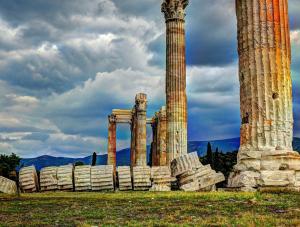 In recent months, much of the intellectual energy among conservative thinkers has been oriented toward a reexamination of first principles—whether, for instance, the American social order was always destined to abandon tradition and collapse into a tribalistic struggle for power. As I’ve written about here and elsewhere, that reexamination has played out across multiple online publications and in the pages of numerous recent books. Mark T. Mitchell’s new volume, The Limits of Liberalism, is a fruitful extension of that conversation.
In recent months, much of the intellectual energy among conservative thinkers has been oriented toward a reexamination of first principles—whether, for instance, the American social order was always destined to abandon tradition and collapse into a tribalistic struggle for power. As I’ve written about here and elsewhere, that reexamination has played out across multiple online publications and in the pages of numerous recent books. Mark T. Mitchell’s new volume, The Limits of Liberalism, is a fruitful extension of that conversation.
As it so happens, Mitchell—chair of the government department at Patrick Henry College—was my undergraduate political theory professor. (He did his best with us, but far too many of us were focused on the bare mechanics of politics (matters of technē) rather than the logic of the polis itself. If only I could go back and tell my twenty-year-old self to pay better attention.)Much of Mitchell’s scholarly work has focused on issues of scale, place, and community, contra the universalizing cosmopolitanism common to contemporary neoliberal culture. (His arguments have much in common with those of Yoram Hazony, though the two might differ with respect to the ideal size of a political community.) The Limits of Liberalismis a more aggressive text, one that examines the premises of modern life and finds many of them wanting.
Happily, his new book strikes me as perhaps the best of the recent flurry of “postliberal” conservative texts (and I’m fairly sure I’ve read most of them). I have a deep and abiding admiration for writers who can seamlessly draw on the insights of philosophy, theology, and the arts, weaving these elements into a compelling argument (Anthony Kronman, Charles Taylor, and Leo Strauss spring to mind)—and Mitchell’s book, which invokes thinkers as disparate as St. Augustine, Rene Descartes, and T.S. Eliot, is just such an achievement.
Mitchell gratifyingly resists the urge to justify his critique of liberalism by racking up examples of moral decline in society (a vice far too many conservative writers indulge). Instead, he begins by noting (quite uncontroversially) that much of contemporary liberalism refuses to recognize the legitimacy of tradition (understood quite broadly to encompass religion, inherited wisdom, cultural narrative, and so forth) as a source of real knowledge that may be deployed in the public square. This, Mitchell contends, is a profoundly incoherent stance.
Through close readings of the philosophers Michael Oakeshott, Alasdair MacIntyre, and Michael Polanyi, Mitchell argues persuasively that all knowledge necessarily proceeds from indemonstrable first principles (such as the very affirmation of a reality external to human beings, or the belief that one’s senses are reliable guides to that reality) that cannot be demonstrated deductively. These first principles mustbe accepted—try as one might to avoid them—in order for any rational inquiry whatsoever to proceed. The pattern of intellectual inquiry that proceeds from such first principles thus becomes a tradition of rationality. Indeed, the very use of language to communicate truth-claims about the world presupposes such a tradition: we generally assume without question that certain linguistic utterances have a stable meaning across conversations, that the objects referred to by words are ascertainable between speakers, and so forth.
This insight, if carried to its logical conclusion, guts the Rawlsian notion of “public reason.” To the extent that the members of a liberal social order seek to purge “faith-based’ reasoning from the public square—that is, to predicate public decision-making on the basis of entirely neutral principles perfectly demonstrable to all—those members delude themselves. No exercise of rationality, however ambitious, can ever free itself from the need for indemonstrable priors. This tension can only be resolved through what Polanyi described as “pseudo-substitution”: a regime pays lip service to neutrality while demonstrating a commitment to certain first principles through its actions.
Despite acknowledging this irresolvable contradiction at the heart of modern liberalism, Mitchell is no integralist or “Aristopopulist.” The alternative he proposes is one of “humane localism”—a political order that (speaking broadly) recognizes the inevitably tradition-bound character of rationality, the smaller settings within which those traditions develop, and the necessity of space for those traditions to flourish. It’s not entirely clear if Mitchell shares Montesquieu’s skepticism about large-scale republican projects, but there are clear gestures in that direction.
While its outline of a postliberal order perhaps leaves something to be desired, all in all The Limits of Liberalism is a powerful and well-reasoned book with a central argument that—to my mind—truly succeeds. What’s more, it manages to avoid many of the issues currently fracturing the emerging postliberal right: perhaps I’m showing my Protestant colors here, but the book is greatly helped by the fact that Mitchell (an Anglican) doesn’t slip into some version of the “Reformation ruined everything” argument. His arguments are leaner and sharper, focused more on the conceptual difficulties of Enlightenment-era rationalism than on the need for a totalizing system of social authority. This, I imagine, will give his arguments a far greater reach among contemporary conservatives.
One issue Mitchell never really addresses, however, is the question of constitutionalism (and, by extension, what it means for a tradition to develop “legitimately”). Presumably, an authoritative text such as a constitution or charter can lay the groundwork from which a coherent tradition of rationality may develop (namely, the common law, the statutory code, and judicial precedent). But judging by the divisions in American political life today, constitutionalism alone seems insufficient. To my mind, it would appear that successful reasoning within a tradition inevitably requires certain hermeneutic commitments (such as some form of adherence to a principle of “original meaning”) that extend beyond one’s mere profession of affiliation with a particular tradition. The absence of such additional commitments, it would seem, leads to the desaturation—and ultimately, the dissolution—of a tradition, as the tradition becomes indistinguishable from its rivals.
This, I admit, is a comparatively minor omission—and perhaps one that does not directly bear on Mitchell’s project here. As it stands, The Limits of Liberalism is a compelling and worthwhile contribution to the ongoing intellectual debate over the future of political life in the West—and it undoubtedly belongs on any philosophical conservative’s reading list.












